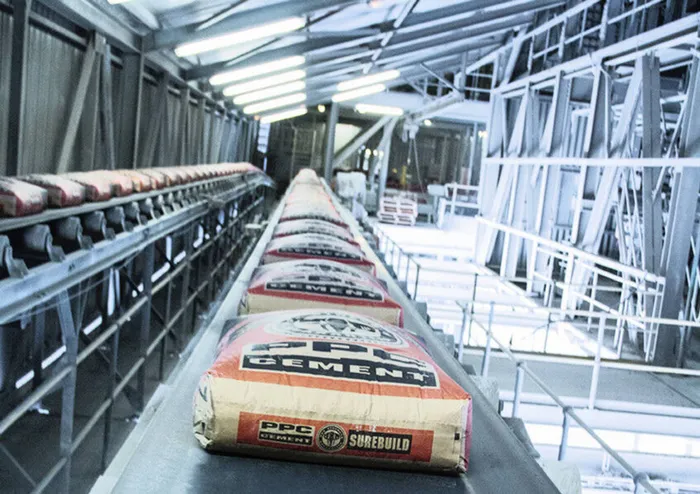PPC faces better economic outlook, is optimising product mix, doing logistics more efficiently

PPC Cement bags on a conveyor belt at PPC’s De Hoek plant in the Western Cape. Picture : Supplied
PPC, the biggest cementitious product company in the southern African region, has identified opportunities to optimise their product months, enhance their logistics footprint and expand their customer base, newly-appointed chief executive Matias Cardarelli said.
Writing in the group’s integrated annual report released on Friday, he said they had weathered a challenging operating environment in the year to March 31, 2024, marked by increasing input costs, constrained consumer spending, unreliable power, poor service delivery from Transnet Freight Rail and high interest rates.
Despite these challenges, PPC delivered a satisfactory performance, lifting revenue 20.6% to R10.06 billion, driven primarily by a strong performance by PPC’s Zimbabwean operation. Group earnings per share increased to 19 cents, from a 20 cents loss in the prior year. A dividend was declared for the first time since 2015.
Another milestone had been the exit of its East Africa operations through the sale of CIMERWA, the group’s chairman Jabu Moloketi said.
Moloketi said there were positive signs in the medium-term macroeconomic environment in South Africa. The country’s strong fundamentals – including population growth, urbanisation, infrastructure needs and low cement consumption per capita, compared with similar markets – provided a solid foundation for continued demand for cement.
The 100 days without load shedding in the first half of 2024 provided a steady operating environment for PPC and other producers. It also supported its sustainability efforts by enabling constant operations and reducing reliance on carbon-intensive back-up generators.
The group’s decarbonisation strategy was based around reducing the clinker factor, increasing alternative fuel and alternative raw materials utilisation, and improving operational efficiency, and integrating renewables. Moloketi said these ambitions had been internalised across PPC’s operations,
Cardarelli, appointed from October 1, 2023, said their margins came under pressure in SA and at Botswana cement in 2024, despite a 10% price increase.
In the second half, results fell mainly due to changes in the trading environment and price resistance from competitors, who did not follow PPC's price increase in January 2024.
“Without the positive impact from clinker sales to Zimbabwe and end of the year stock build-up, our EBITA (earnings before interest tax depreciation and amortisation) in 2024 would have decreased compared to the previous year. Our main cash cost lines, including variable and fixed costs, increased by almost 10%, putting pressure on margins,” he said.
There were capacity changes during the year: The Jupiter milling plans was mothballed; the Highveld blending plant became operational later; and the sewing kilns in Slurry and Dwaalboom were not operational during the year, but were ready to be activated if needed.
The Materials business results had shown improvement following a challenging 2023. The Readymix results had begun to deteriorate in the third quarter, with a decrease in volumes leading to a 18% reduction for the full year.
The business continued to face challenges due to low demand and competitive pricing in certain regions, Despite this, Readymix remained a crucial channel in the market, and efforts were underway to optimise its footprint and operational model,
In Zimbabwe, the results were driven by revenue growth of over 53% in the past year, which was primarily due to a volume growth and higher selling prices. Challenges in the second half, such as lower traction from national government projects, changes in tax regulations affecting the informal market and an influx of imports continued into the new financial year.
“Looking ahead, we anticipate the more normalised operating environment (in Zimbabwe),” said Cardarelli.
BUSINESS REPORT
Related Topics: